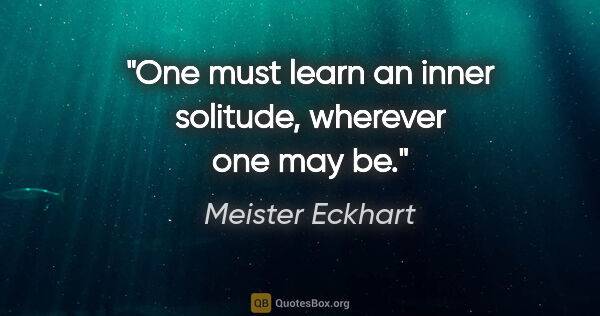Wherever Quotes (page 8)
Some people prefer solitude. They say their peace of mind depends on this. Others say they would be better off in church. If you do well, you do well wherever you are. If you fail, you fail wherever you are. Your surroundings don't matter. God is with you everywhere -- in the market place as well as in seclusion or in the church. If you look for nothing but God, nothing or no one can disturb you. God is not distracted by a multitude of things. Nor can we be.
Meister Eckhart
I try to congure, to raise my own spirits, from wherever they are. I need to remember what they look like. I try to hold them still behind my eyes, their faces, like pictures in an album. But they won't stay still for me, they move, there's a smile and it's gone, their features curl and bend as if the paper's burning, blackness eats them. A glimpse, a pale shimmer on the air; a glow, aurora, dance of electrons, then a face again, faces. But they fade, though I stretch out my arms towards...
Margaret Atwood

Thus, to give an obvious instance, if I have once enjoyed the cool shade of a tree, and been lulled into a deep repose by the sound of a brook running at its feet, I am sure that wherever I can find a tree and a brook, I can enjoy the same pleasure again. Hence, when I imagine these objects, I can easily form a mystic personification of the friendly power that inhabits them, Dryad or Naiad, offering its cool fountain or its tempting shade. Hence the origin of the Grecian mythology.
William Hazlitt
He did not wish to be divine. If there had never been a God, the emperor thought, it might have been easier to work out what goodness was. This business of worship, of the abnegation of self in the face of the Almighty, was a distraction, a false trail. Wherever goodness lay, it did not lie in ritual, unthinking obeisance before a deity but rather, perhaps, in the slow, clumsy, error-strewn working out of an individual or collective path.
Salman Rushdie
I hold it clear, therefore, if anything is clear about the
business, that the Eugenists do not merely mean that the mass of
common men should settle each other's marriages between them; the
question remains, therefore, whom they do instinctively trust when
they say that this or that ought to be done. What is this flying
and evanescent authority that vanishes wherever we seek to fix it?
Who is the man who is the lost subject that governs the Eugenist's
verb? In a large number of cases I think...
Gilbert K. Chesterton

